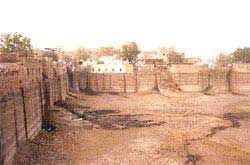An immense potential
An immense potential

Bhawar Singh from Sindhi Colony in Jodhpur had drilled a borewell in the late '80s with the sole intention of selling water. Charging Rs 10 on an average for filling one tractor with water, this is his only source of income today.
Since 1980-81, water has turned into a scarce, and therefore saleable, commodity in Jodhpur - a situation engendered primarily by the gross neglect of traditional local water sources. The vast potential of these sources are now being recognised. According to Mahesh Sharma, an engineer at the public health engineering department who is fighting for their renewal, these sources can easily meet a month's water requirements of the entire city (about 0.08 million cubic metre per day). During acute droughts, water could be supplied on alternate days, and these sources could thus meet the city's needs for two months. Most reservoirs dry up in drought years. As local sources are near the places of demand, it is easier to distribute water from these. This also reduces loss of water during transmission. The cost of bringing water to Jodhpur by road and rail has been increasing; tapping of local sources will obviously be far more economical.







